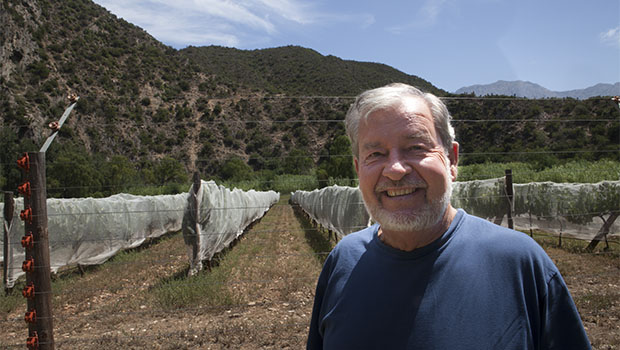South Africa's finest wine, off the grid


GROENFONTEIN VALLEY, South Africa -- Peter Bayly's first attempt at producing wine was an utter failure. He and his wife Yvonne had first planted their vineyard in 2000, expecting to harvest it three years later. After returning to the vineyard from their home in Cape Town, they found their fields ravaged and their hopes of a 2003 vintage dashed. Hundreds of baboons had descended through the mountain passes surrounding Bayly's plot, picking the vines clean.
"Not even a single grape was left," Bayly said.
To make a real go at winemaking, the former hotelier realized he had to move to his farm and make do with what he had there. Bayly's vineyard sits about five miles from the nearest electrical grid, a burden the would-be vintner eventually turned into a blessing.
Bayly installed eight 70W solar panels that still supply his farm with almost all the power it needs. The vineyard is one of many small farms that rely on solar power in the valleys outside of the winemaking town of Calitzdorp. "In our area, everyone uses solar," he said.
"There are no outages," Bailey said of his solar-powered vineyard. He added that blackouts in the nearby town can last for days, and have sometimes coincided with the crucial time around harvesting.
The panels power the farm's house, the vineyard's pumps and an addition meant to keep the baboons at bay: a large electric fence.
Wedged between the mountains of the Western Cape, South Africa's wine region is subject to the whimsy of trends in the global wine market. Most South African wine is produced for export, and since bans and sanctions were lifted with the coming of democracy, consumers from around the world have warmed to the country's wines.
Calitzdorp is known for producing a fortified wine nicknamed "port" or "porto" traditionally produced in the Douro valley in Portugal. Port is made by adding additional brandy to the wine during the normal fermentation process, halting it. This usually leaves port sweeter than other wines and with a higher alcohol content. These fortified varieties are often considered "dessert" wines and enjoyed after meals.
Port requires less refrigeration, and therefore less energy, than other wines and is ideal for vineyards like Bayly's where power is at a premium. Port is also more more forgiving to make during its production process. "Because of the alcoholic content of port, you'd have to do something really idiotic to screw it up," Bayly said.
Ports, once all the rage in cigar bars and fine restaurants throughout the world, has fallen on hard times. The effects have rippled to Bayly's plot outside of Calitzdorp. Bayly says he'd like to sell more than the 7,000 liters he moves annually, and he's hoping that the world's appetite for port will grow in the future.
"We haven't given up by any means," said Bayly, adding that he planned to make even more investments in solar power in the coming years.
Calitzdorp is located in South Africa's Klein Karoo, a semi-arid region about 240 miles outside of Cape Town. The town is one of dozens of wine-producing settlements that stretch inland from the coast, each with its own specialty and unique history.
South African has a long history of winemaking, with the first recorded production dating back to 1659, only five years after the establishment of a Dutch colony on the Cape of Good Hope. That year, on February 5, the colony's founder, Jan Van Riebeck, wrote "Today, praise be to God, wine was pressed for the first time from Cape grapes." The Cape is still the heart of South African wines, and the nearby Stellenbosch University even has a four-year program for the study of wine and grapes.
For more than 350 years the Cape has produced some of the most sought-after wines in the world, including the port that comes out of Calitzdorp.
While European wine purists will argue that the only true port comes out of Portugal, Calitzdorp's vintners like Bayly are fierily proud of what they produce, saying that the two regions are nearly identical--baboon raids and lack of electric grids not withstanding.
Photos: Dave Mayers; peterbayly.co.za
This post was originally published on Smartplanet.com